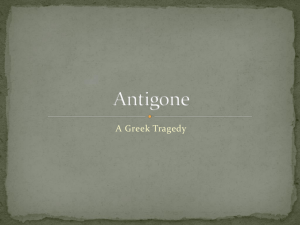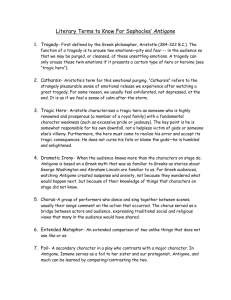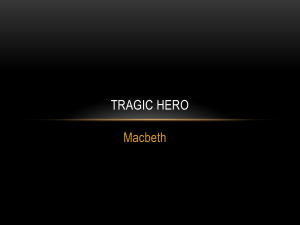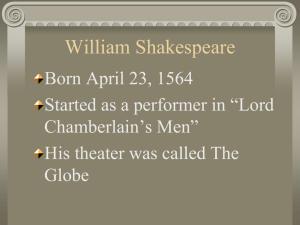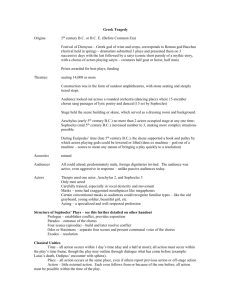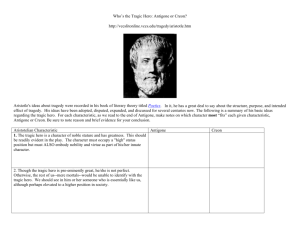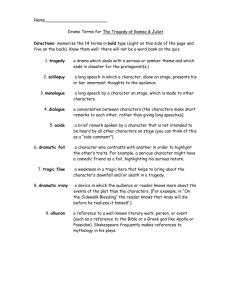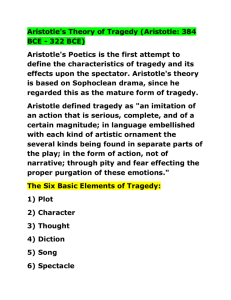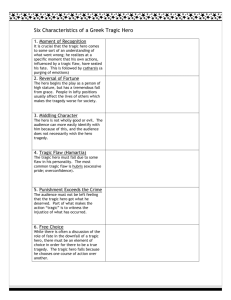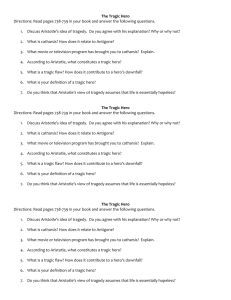Introduction to Greek Tragedy
advertisement
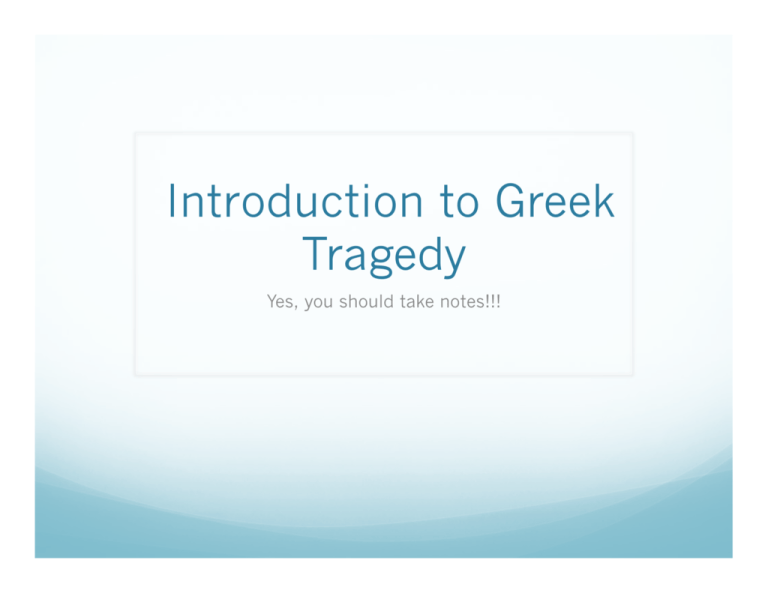
Introduction to Greek Tragedy Yes, you should take notes!!! Literary tragedy A courageous individual who confronts forces within or outside of himself with dignity and thus shows the depth of the human spirit. Greek tragedy Someone extraordinary who is brought from happiness to agony . The play focuses on how the hero deals with the challenge. The Domino effect The tragic events follow not just after one another but because of one another. Aristotle developed the classic definition for tragedy in Poetics in the 4th century Aristotle’s archetypal idea of tragedy Aristotle’s ideas have dominated critical thought on Greek tragedies. He discussed six central features of the archetype. First, a noble person Tragic heroes= men of noble stature (better than the common man) who go from happiness to misery. If the hero’s fall is to arouse emotions of pity and fear he must fall from a height. Second, the tragic hero The tragic hero is good, but not perfect. Hamartia=the character’s mistake; “an act of injustice” through ignorance or a “tragic flaw,” some weakness of character (pride, excessive ambition, passion), that brings on disaster. Aristotle did not see the flaw as a character flaw or personality flaw. He believed actions, not a personality brought about tragedy. Later critics labeled it a “tragic flaw.” Third, The hero’s downfall is his own fault; it is a result of his own choice which leads to his fall from greatness. Example: Hubris=arrogance, excessive self-pride and self-confidence which leads the tragic hero to ignore warnings from the gods and thus invite catastrophe. Hubris is a form of hamartia that stems from overbearing pride and feelings of superiority Fourth, The hero’s misfortune is not totally deserved; the punishment exceeds the crime. Wasted human potential Catastrophe= downturn; marks a change in the hero’s status Fifth, reversal and recognition The tragic fall is not pure loss. Increase in awareness or self-knowledge Peripeteia=“reversal” in the external situation of fortunes of the main character Anagnorisis=“recognition” in which the character responds to the change Sixth, catharsis According to Aristotle, a tragedy: Arouses pity and fear and leads to catharsis Catharsis= purging of pity and fear; a state of emotional release for the audience. The Format Greek tragedy is divided into 5 parts. Prologue The opening of an ancient drama Exposition, usually in the form of a soliloquy or a dialogue Parados The first time the chorus enters and gives perspective on prologue in a marching rhythm A side entrance Episodia Introduces debates and conflicts There are several episodes in each play The spoken part Stichomythia: in ancient Greek: conversation in alternate lines Stasimon After each episode, the chorus interrupts to give perspective. The stasima are sung in a standing rhythm Ode- a lyric song • Strophe(a turning): A part of the ode/stasismon which precedes and corresponds metrically to an apostrophe Antistrophe (opposite turning) opposite to strophe Exodus Resolution Means “exit” The exit and closing song in a Greek drama Choregos Choregos (leader of the chorus): In Athens, the rich guy who funds the training and costuming of the chorus (the state paid the actors). In exchange for his generosity, he gets to play the lead choral part! Introduces and questions characters. Advises central characters; serves as a VOICE OF REASON. The role of the Chorus The Ideal Spectator: Responds to the play in a manner the playwright wants the audience to respond. Reflects upon what has happened; ponders what might happen; asks questions. The conscience of the people -- moral compass. Establishes mood through movement & song. Covers the passage of time between events.
